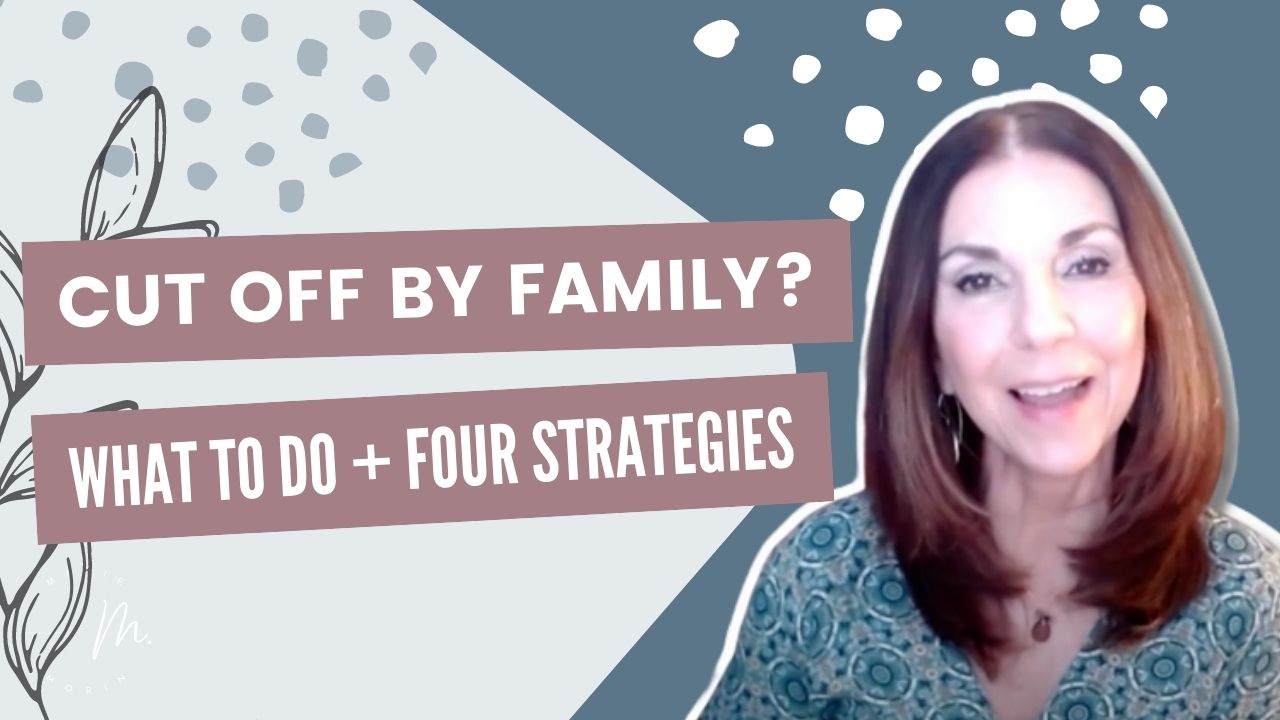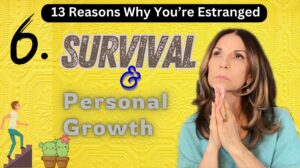Estrangement is a relatively new term describing cut-off and alienation from a family member. At least 27% of the U.S. population admit to having this condition. Interestingly, so many are ashamed that they are less likely to accept being estranged. For this reason, the epidemic of being rejected by one or more family members is widespread.
Often, there is bewilderment. Thoughts such as “What on earth did I do?” or “They are totally to blame; I did nothing.” For the abused, the answer is obvious. Abuse requires one to separate to preserve themselves and their well-being. But in the absence of abuse, estrangement is rarely just one person’s responsibility. Successful reconcilers and those able to move forward reflect on the perspective of their estranged loved ones. Getting from bewilderment to awareness of one’s role in the estrangement is difficult but not impossible. This article discusses What to Do When You Are Cut Off By Family- Four Strategies When You Don’t Know What You Did.
Families Are Complicated
No one starts off thinking in their wildest dreams that their adult child will kick them to the curb one day. Or that a family member will ignore and shun them. It is an act of self-preservation to separate from family members, as in cases of abuse and narcissistic behaviors.
In the absence of abuse, your objective is probably to reconnect and reconcile. Strong emotions such as regret, anger, fear, frustration, shame, loss, grief, and confusion are part of the estrangement condition.
If you are in a highly emotionally charged state, allow the grieving process to take its course. In other words, it is essential to process the magnitude of your feelings, progress to a lessened intense state, then provide time for self-reflection. The grieving process deserves attention as well as intentional self-care.
Ready To Move Forward
When you are ready to contemplate what might have gone wrong, you must be both compassionate and objective. Being caught in a ditch of shame, self-blame, and hyper self-critical thinking reveals an imbalanced state. Get support and take special care.
It’s Not Just Your Fault or Their Fault
While all parties partook in the estrangement, not one person is solely to blame. Estrangement and the scope of what occurred are not easily discernable. The family’s historical patterns and personalities interact with each other and environmental stressors. Were the members emotionally stable and reliable? Was their alcohol use or mental illness in the family? Did the family have too few boundaries, or was it rigid?
Families that struggle financially and have unstable homes impact the well-being of their members. Emotionally distanced parents and controlling parental figures contribute to reasons for estrangement. There is a myriad of factors that undermine the fabric of relationships.
In addition, family relationships with high conflict, secret-keeping, demanding expectations, and frequent criticisms are burdensome. Demeaning family members harm children and adults alike. Arguments that become duels of nasty or rude comments are equally damaging. Consider the impact of using guilt to motivate. Sometimes family members suffer from an emotional distance. Less than essential human connection where one can feel heard and be themselves creates a void. Unless you are perfect, you can relate to one behavior, at least.
Be Cautious
Remember that reflection is not an exercise in self-condemnation but to gain insight so you can grow. Many individuals benefit from professional support. Therapy provides a safe space for one to grieve or defend their actions to bring relief. The following strategies may be a bitter pill to swallow. If someone has called you defensive, you very likely are. It takes courage to step into enlarging our awareness outside of our limited presuppositions of what caused the estrangement. Indeed, you are no stranger to acting in the face of uncomfortable situations.
Taking Responsibility For Your Part
The critical piece of rekindling and moving into the future with a relationship with your estranged loved one is to take responsibility. The most significant barrier believes you had absolutely nothing to do with the estrangement. Dr. Karl Pillemer, author of the book Fault Lines Fractured Families and How to Mend Them, states, “If you want to reconcile, you have to understand that and stop throwing blame totally on the other person. Drop the blame altogether and say this is the situation and this is what happened and accept that. “
Have You Thought About Defensiveness?
Humans naturally develop their narrative and decide how they make meaning of events. We process stressful events in a way that makes sense to us. The process of perspective-taking is challenging because when we are cut off from someone, we perceive it as a threat. Even if the relationship was strained and less than optimal, it operated within our framework of familiarity. When an event ignites the final straw, we react and become defensive to protect ourselves. It feels uncomfortable and unsafe for the familiar to transform into an ambiguous and uncertain condition.
According to Pillemer, when we approach estrangement non-defensively, we can examine the facts, consider what is wrong with our strategies, and look for ways to improve and make adjustments.
Ignorance To The Nature of Defensiveness
The obstacle to gaining a non-defensive awareness is ignorance of the nature of defensiveness.
Pillemer elaborates, “defensiveness encourages us to selectively edit the information we receive, treating the information as facts.” As a result, we cling to the events and perspectives that help protect our self-esteem and dismiss those that may compromise our positive view of ourselves.
We want to know what went wrong, but we argue or invalidate what is said. When asked, many estranged send letters explaining their side of the story. Many of Pillemer’s interviewees reacted by dismissing and accusing their family members of lying.
But, in the course of relationships, there are specific points in time, “volcanic events,” considerable conflicts, differences in values, and personality conflicts that have likely led to the estrangement. For some, due to defensiveness, it is not apparent. Pillemer found that successful reconcilers did not expect the other to take the whole blame for the rift but to recognize their part.
Are you ready to move forward in your exploration of the rift?
Pillemer’s Four Strategies to Taking Responsibility
1.Try Perspective Taking
What might the other person’s perspective be? It may be tempting to see the situation in black and white thinking. They did this, and it was wrong. Perspective-taking is not about taking
the full blame and making it all your fault. You are merely looking at how they might see it.
Empathy is a cognitive skill that improves with the time that allows us to put ourselves in another’s shoes and imagine their perspective. Empathy considers how they might feel. You and your estranged person have very different psychological viewpoints.
Pillemer’s interviewees explained the skill as challenging but worth the effort. Self-talk is the exercise of examining how we think and speak to ourselves. When one contemplates the skill of perspective taking, they include the other’s possible viewpoints into the milieu of thoughts. They choose to come out of limited self-perspective. Accompanying this is the intentional resistance of self-validating thinking. Successful reconcilers took the risk of speaking to others who did not only validate their perspectives. In so doing, perspective taking and being open to objective opinions is the ability to come out from under hurt, anger, and betrayal.
Self-examination is no simple task. Regardless of the outcome of your relationship, it will help you to move forward, out of the defensive and stuck mode.
2. Harness The Power of Writing
Many estranged family members have resorted to sending letters or emails listing grievances and how they were wronged. Indeed not a welcome letter to receive. Harnessing the Power of Writing is an exercise in writing on behalf of your estranged person addressed to you.
What would they say to you that prompted them to detach? What was their side of the story?
If you have already received a brutally honest letter, you may have dismissed it as being stuck in defensiveness. Write another letter considering what your estranged person might say with as much objectivity as possible.
If you are able, this strategy will allow you to process what happened from your eyes and your family member’s eyes. If you are resistant to taking their perspective, then try writing it in the third person- as an objective, neutral observer wants the best for both of you. Before you begin, do your best to find calm, get out of the heat of your emotions, write, and then endeavor to understand better. You step back into the past to see their point of view, asking what my role was.
3. Expand Your Feedback Loop
The human tendency in response to stressful family events is to talk about it with others and get support from people who listen but also agree with us and our narrative. Support groups can be very sympathetic, but it is unlikely you receive differing viewpoints.
Talking to people who have different perspectives may be uncomfortable but enlightening.
Support groups other than estrangement groups or church groups can serve this purpose. The compassion we receive from friends is invaluable. They want to be on your side. Speaking to a neutral party will help you gain insight.
Another option is to contact a distant relative who has not been involved in the estrangement and ask their feedback. You may not always like what you hear. , But you will gain awareness when others have the freedom to give you their objective assessment.
Successful reconcilers can step back to move forward and try perspective-taking.
They write about the estrangement from the other’s perspective or a neutral, objective third party. Others’ feedback outside of their agreeable inner will bring valuable thought and reflection. Practicing these strategies helped them in their role in the separation.
4. Abandon the Need to Be Right
We all enjoy winning an argument. The need to be right can thwart your attempts to implement the three strategies. It will stake a claim on your defensiveness. Is it worth needing to be right? What will it cost you?
To reconcile is to make amends, settle a dispute, and call for a cease-fire. Often there is no way to reconcile the two versions, and reconciliation is accepting that fact. Reconcilers of estrangement were willing to relinquish needing to win their point. To reconcile when two opposing viewpoints relate to one’s resigning, the need for both sides to agree on one narrative.
Research on Successful Reconcilers
Dr. Karl Pillemer, sociologist and researcher, and his team interviewed 100 estranged individuals who reconciled. In his book, Fault Lines, Fractured Families and How to Mend Them, he describes the strategies of successful reconcilers abandoning the need for an apology, having their loved ones align with their side of the story, and being willing to move into a new future relationship. In addition, he found that three ideas prodded them before these reconcilers took action.
Reconcilers thought about anticipatory regret or the idea of how they would feel if they did not reconcile. Getting back into the family became a value they wanted to regain since family members often take sides. They were willing to proceed to arrive at the fullness of the family experience. Lastly, successful reconcilers were inclined to take the risk to gain interpersonal resources, such as having someone to count on and speak with regularly.
Reconciliation In Cases of Abuse
Cutting off from an abusive family member is recommended to preserve the well-being of the abused. The impact of abuse includes depression, anxiety, insecurity, cognitive impairment, and complex trauma.
Emotional abuse consists of the abuser’s use of criticism, isolation, and control to break down the family member’s sense of self and autonomy. Family emotional abuse can often occur insidiously where the abused is unaware that their abuser’s behavior is harmful to them.
The abusive behaviors may be manipulation, withholding love and affection, unpredictable anger, and pitting one family member against the other. Physical abuse can include hitting, kicking, sexual inappropriateness, and aggressive actions. The family dynamic can be typically dysfunctional and unhealthy for members to thrive independently and within the family.
When considering the possibility of reconciling with an emotionally and or physically abusive great care is required. Counseling can assist in creating boundaries, making sense of what happened and what continues to happen, and learning how to regain and develop a healthy identity away from the abuser. Therapy is an opportunity to talk with a trusted professional who will listen to your concerns. When there is abuse, consider taking positive steps forward towards healing with the help of a therapist. Reconciling may only be possible if the abuser is willing to work with a family therapist. Consider if it is safe to resume a relationship with an abusive family member without evidence that the abuser has changed or takes responsibility for their harmful actions.
When there is a history of abuse, the notion of reconciling requires the professional guidance of a therapist and insight into the abuser’s recognition of their behaviors. More to the point, therapeutic work is essential for both parties and the assurance of future emotional and physical safety. Kylie Agllias, researcher, and educator, in her book Family Estrangement A Matter Of Perspective, explains that commitment, insight, and integrity are needed to reestablish trust.
Estrangement is a relatively new term describing cut-off and alienation from a family member. At least 27% of the U.S. population admit to having this condition.
Often, there is bewilderment. Thoughts such as “What on earth did I do?” or “They are totally to blame; I did nothing.” It is essential for those who have been abused to preserve their well-being. In the absence of abuse, estrangement is rarely just one person’s responsibility. Successful reconcilers and those able to move forward reflect on the perspective of their estranged loved ones. Getting from bewilderment to awareness of one’s role in the estrangement is difficult but not impossible. This article discusses What to Do When You Are Cut Off By Family- Four Strategies When You Don’t Know What You Did.
Get The eBook: Feeling Heartbroken and Alone? How to Pick Up the Pieces When You are Estranged.
Resources:
- Agllias, Kylie. Family Estrangement A Matter Of Perspective. New York, Routledge, 2017.
- Coleman, Joshua. Rules of Estrangement. New York, Harmony Books, 2020.
- Morin, Marie. Feeling Heartbroken and Alone? How to Pick Up the Pieces When You are Estranged. eBook. 2022.
- Morin, M.L. [Morin Holistic Therapy]. (2022, January 4 ). What is Family Estrangement? You Are Not Alone.
- Morin, M.L. [Morin Holistic Therapy]. (2021, September 8). Diaphragmatic Breathing: 5 Minute Deep Breathing Exercise for Beginners.
- Morin, Marie. How to Deal with Estranged Family During the Holidays (2021, November 21) Sixty and Me. https://sixtyandme.com/estranged-family-holidays/
- Pillemer, Karl. Fault Lines Fractured Families and How to Mend Them. New York Penguin Random House, 2020.





